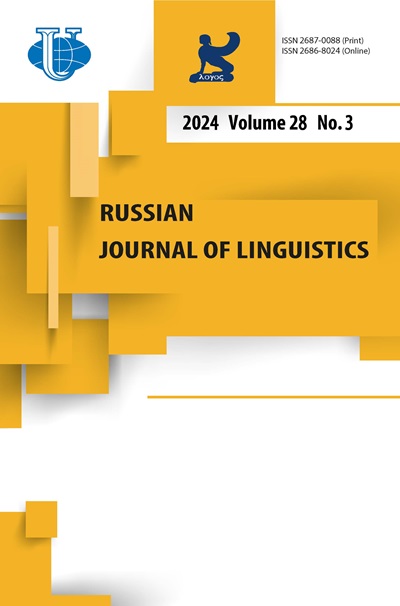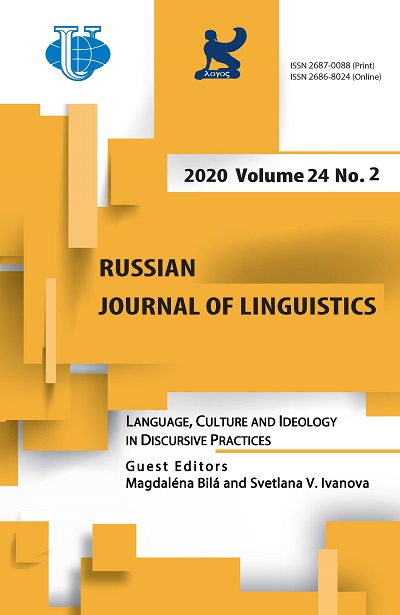Отражение языковой политики и идеологии в языковом ландшафте Камеруна
- Авторы: Пютц М.1
-
Учреждения:
- Университет Кобленц-Ландау
- Выпуск: Том 24, № 2 (2020): Язык, культура и идеология в дискурсивных практиках
- Страницы: 294-324
- Раздел: Статьи
- URL: https://journals.rudn.ru/linguistics/article/view/24095
- DOI: https://doi.org/10.22363/2687-0088-2020-24-2-294-324
Цитировать
Полный текст
Аннотация
Статья посвящена изучению языкового ландшафта в африканском государстве Камерун с особым вниманием на его столицу - город Яунде. Языковой ландшафт - относительно недавняя область исследований, и ее можно в широком плане определить как визуальное представление языка в публичном пространстве. В статье показано, что языковой ландшафт может служить отражением языковой иерархии и идеологии, а также актов сопротивления в многоязычных и многокультурных сообществах. Проведено исследование социолингвистической ситуации в Камеруне, которая имеет первостепенное значение для понимания языковых и идеологических конфликтов между англоязычным меньшинством и франкоязычным правительством. Изучение языкового ландшафта Камеруна проведено с учетом социолингвистического состава изучаемого языкового пространства, которое представляют английский язык, французский язык, английский пиджин, так называемый Камфранглиш - смесь камерунских вариантов французского и английского языков и пиджина - и, в незначительной степени, коренные африканские языки. Материалом исследования послужили более 600 запечатленных на фотографиях языковых примеров, собранных в различных общественных местах, главным образом в городе Яунде и его окрестностях, которые были проанализированы с применением количественного анализа. В статье показано, что в этнически неоднородном и лингвистически гибридном обществе, каким является Камерун, языки, используемые на знаках и разного рода надписях, помимо выполнения информационных и символических функций, также имеет социальное и политическое значение. Если, как свидетельствуют факты, в некоторых других бывших британских колониях, например, в Ботсване, Руанде, Танзании, общественное пространство символически создается с целью сохранения некоторых языков коренных народов Африки, то в Камеруне языковой ландшафт ориентирован почти исключительно на доминирующий по статусу и роли французский язык и, в меньшей степени, на английский язык, носители которого чувствуют себя маргинализованными и угнетенными французским правительством.
Ключевые слова
Об авторах
Мартин Пютц
Университет Кобленц-Ландау
Автор, ответственный за переписку.
Email: Puetz@uni-landau.de
профессор английского языкознания
Ландау, ГерманияСписок литературы
- Abongdia, Jane-Francis A. & John Wankah Foncha. 2017. The visibility of language ideologies: The linguistic landscapes of the University of Yaoundé. Gender & Behavior 15 (2). 8674-8680.
- Anchimbe, Eric. 2013. Language Policy and Identity Construction: The Dynamics of Cameroon’s Multilingualism. Amsterdam/Philadelphia: John Benjamins.
- Banda, Felix & Hambaba Jimaima. 2015. The semiotic ecology of linguistic landscapes in rural Zambia. Journal of Sociolinguistics 19 (5). 643-670.
- Barni, Monica & Carla Bagna. 2010. Linguistic landscape and language vitality. In Elana Shohamy, Eliezer Ben-Rafael & Monica Barni (eds.), Linguistic landscape in the city, 3-18. Bristol: Multilingual Matters.
- Ben-Rafael, Eliezer, Elana Shohamy, Muhammad Hasan Amara & Nira Trumper-Hecht. 2006. Linguistic landscape as symbolic construction of the public space: The case of Israel. International Journal of Multilingualism 3 (1). 7-30.
- Blackwood, Robert, Elizabeth Lanza & Hirut Woldemariam (eds.). 2016. Negotiating and Contesting Identities in Linguistic Landscapes. London/New York: Bloomsbury.
- Caldwell, David. 2017. Printed t-shirts in the linguistic landscape: A reading from functional linguistics. Linguistic Landscape 3 (2). 122-148.
- Coulmas, Florian. 2009. Linguistic landscaping and the seed of the public sphere. In Elana Shohamy & Durk Gorter (eds.), Linguistic landscape: Expanding the scenery, 11-24. New York: Routledge.
- Dagenais, Diane, Danièle Moore, Cécile Sabatier, Patricia Lamarre & Françoise Armand. 2009. Linguistic landscape and language awareness. In Elana Shohamy & Durk Gorter (eds.), Linguistic landscape: Expanding the scenery, 253-269. New York: Routledge
- Eberhard, David M., Gary F. Simons & Charles D. Fenning (eds.). 2019. Ethnologue: Languages of the World. 22nd edn. Dallas, Texas: SIL International.
- Echu, George. 2003. Coping with multilingualism: Trends in the evolution of language policy in Cameroon. Philologie im Netz 25. 31-46.
- Echu, George. 2004. The language question in Cameroon. Linguistik Online 18 (1). 19-34. Eko, Lyombe. 2003. The English-language press and the “Anglophone problem” in Cameroon:
- Group identity, culture, and the politics of nostalgia. Journal of Third World Studies XX (1). 79-102.
- Fonkoua, Hector Kamdem. 2015. A Dictionary of Camfranglais. Series
- Greene, Stephen & Damian Williams. nd. What are linguistic landscapes? https://murbll.wordpress.com/what-is-linguisitic-landscapes/
- Heller, Monica; Pujolar & Alexandra Duchêne. 2014. Linguistic commodification in tourism. Journal of Sociolinguistics. Vol. 18, issue 4. 539-566.
- Hu, Ying-Hsueh. 2019. Multilingual audio announcements: Power and identity. In Martin Pütz & Neele Mundt (eds.), Expanding the linguistic landscape: Linguistic diversity, multimodality and the use of space as a semiotic resource, 132-149. Bristol: Multilingual Matters
- Jaworski, Adam & Crispin Thurlow (eds.). 2010. Semiotic Landscapes: Language, Image, Space. London/New York: Continuum.
- Juffermans, Kasper. 2015. Local Languaging, Literacy and Multilingualism in a West African Society. Bristol: Multilingual Matters.
- Kießling, Roland. 2005. ‘bak mwa me do’ - Camfranglais in Cameroon. Lingua Posnaniensis 47. 87-107.
- Kouega, Jean-Paul. 2007. The language situation in Cameroon. Current Issues in Language Planning 8 (1). 3-94.
- Landry, Rodrigue & Richard Y. Bourhis. 1997. Linguistic landscape and ethnolinguistic vitality: An empirical study. Journal of Language and Social Psychology 16 (1). 23-49
- Makoni, Sinfree, Busi Makoni, Ashraf Abdelhay & Pedzisai Mashiri. 2012. Colonial and postcolonial language policies in Africa. In Bernard Spolsky (eds.), The Cambridge handbook of language policy, 523-543. Cambridge: Cambridge University Press
- Makoudjou, Lydie Christelle Talla. 2018. Usage of Cameroonian languages in Cameroon English. https://www.academia.edu/39735506/USAGE_OF_CAMEROONIAN_ LANGUAGES_IN_CAMEROON_ENGLISH20190702_32923_1i4jk90?email_work_c ard=view-paper
- Makoudjou, Lydie Christelle Talla & Solange Mekamgoum. 2019. Exploring linguistic landscape as a teaching approach to language awareness in Cameroon’s secondary schools. In Pius W. Akumbu & Esther P. Chie (eds.), Engagement with Africa: Linguistic essays in honour of Ngessimo M. Mutaka, 301-322. Series
. Band 58. Köln: Rüdiger Köppe Verlag - McLaughlin, Fiona. 2015. Linguistic warscapes of northern Mali. Linguistic Landscape 1 (3). 213-242
- Mooney, Annabelle & Betsy Evans. 2019. Language, Society and Power. 5th edn. London/New York: Routledge
- Mufwene, Salikoko. 2016. A cost-and-benefit approach to language loss. In Luna Filipović & Martin Pütz (eds.), Endangered languages and languages in danger: Issues ofdocumentation, policy, and language rights, 115-143. Amsterdam/Philadelphia: John Benjamins.
- Nana, Genevoix. 2014. Medium of instruction policy and multilingual pupils’ experience of learning to read and write in primary school in Cameroon. In Martin Solly & Edith Esch (eds.), Language education and the challenges of globalization: Sociolinguistic issues, 33-66. Cambridge: Cambridge Scholars Publishing
- Ndille, Roland. 2016. English and French as official languages in Cameroon: The intentionality of colonial representations and the failure of a Cameroon-centric identity; 1884 and after. European Journal of Language Studies 3 (2). 17-33
- Nkamta, Paul Nepapleh & Themba Lancelot Ngwenya. 2017. Linguistic inequality in Cameroon: The case of advertising in Douala. South African Journal of African Languages 37 (2). 137-147.
- Pavlenko, Aneta. 2017. Linguistic landscapes and other sociolinguistic methods in the study of Russian language abroad. The Russian Journal of Linguistics 21 (3). 493-514.
- Pennycook, Alastair & Emi Otsuji. 2015. Metrolingualism: Language in the City. London/New York: Routledge.
- Phillipson, Robert. 2012. Imperialism and colonialism. In Bernard Spolsky (eds.), The Cambridge handbook of language policy, 203-225. Cambridge: Cambridge University Press.
- Pütz, Martin (eds.). 1995. Discrimination through Language in Africa? Perspectives on the Namibian Experience. Berlin/New York: Mouton de Gruyter.
- Pütz, Martin & René Dirven. 2007. Language conflict seen from the perspective of the rationalist and romantic models: New developments. Southern African Linguistics and Applied Language Studies 25 (3). 303-317.
- Pütz, Martin & Neele Mundt (eds). 2019a. Expanding the Linguistic Landscape: Linguistic Diversity, Multimodality and the Use of Space as a Semiotic Resource. Bristol: Multilingual Matters
- Pütz, Martin & Neele Mundt. 2019b. Multilingualism, multimodality and methodology: Linguistic landscape research in the context of assemblages, ideologies and (in)visibility: An introduction. In Martin Pütz & Neele Mundt (eds.), Expanding the linguistic landscape: Linguistic diversity, multimodality and the use of space as a semiotic resource, 1-24. Bristol: Multilingual Matters
- Reh, Mechthild. 2004. Multilingual writing: A reader-oriented typology - with examples from Lira Municipality (Uganda). International Journal of the Sociology of Language 170. 1-41.
- Rubdy, Rani & Selim Ben Said (eds.). 2015. Conflict, Exclusion and Dissent in the Linguistic Landscape. Basingstoke: Palgrave Macmillan.
- Schmitt, Holger. 2018. Language in the Public Space: An Introduction to the Linguistic Landscape. No publisher.
- Schneider, Edgar. 2007. Postcolonial English. Varieties around the World. Cambridge: Cambridge University Press.
- Schulte, Marion. 2016. Language contact and language politics in Ireland: Linguistic landscapes in South Dublin. 10plus1: Living Linguistics 2. 118-130.
- Scollon, Ron & Suzie Wong Scollon. 2003. Discourses in Place: Language in the Material World. London/New York: Routledge.
- Sharifian, Farzad. 2017. Cultural Linguistics. Cultural Conceptualisations and Language. Series
- Shohamy, Elana & Durk Gorter. 2009. Introduction. In Elana Shohamy & Durk Gorter (eds.), Linguistic landscape: Expanding the scenery, 1-10. London/New York: Routledge.
- Shohamy, Elana. 2019. Linguistic landscape after a decade: An overview of themes, debates and future directions. In Martin Pütz & Neele Mundt (eds.), Expanding the linguistic landscape: Linguistic diversity, multimodality and the use of space as a semiotic resource, 25-37. Bristol: Multilingual Matters
- Simo Bobda, Augustin & Innocent Fasse Mbouya. 2005. Revisiting some linguistic concepts and beliefs in the light of the sociolinguistic situation of Cameroon. In James Cohen, Kara 1. McAlister, Kellie Rolstad & Jeff MacSwan (eds.), ISB4: Proceedings of the 4th International Symposium on Bilingualism, 2122-2132. Somerville, MA: Cascadilla Press
- Spolsky, Bernard. 2009. Prolegomena to a sociolinguistic theory of public signage. In Shohamy, Elana & Durk Gorter (eds.), Linguistic landcape: Expanding the scenery, 25-39. London/New York: Routledge
- Stein-Kanjora, Gardy. 2016. Camfrang forever! Metacommunication in and about Camfranglais. Sociolinguistic Studies 10 (1-2). 261-289
- Ugwu, Eucharia Okwudilichukwu. 2019. Africa on the verge of a linguistic genocide: The need for action. European Scientific Journal 15 (23). 57-75
- Woldemariam, Hirut & Elizabeth Lanza. 2012. Religious wars in the linguistic landscape. In Christine Hélot, Monica Barni, Rudi Janssens & Carla Bagna (eds.), Linguistic landscapes, multilingualism and social change, 169-184. Bern: Peter Lang

















